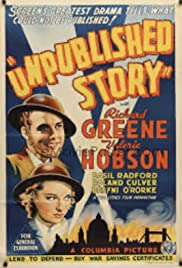
UNPUBLISHED STORY
UK, 1942, 93 minutes, Black-and-white.
Richard Greene, Valerie Hobson, Basil Radford, Roland Culver, Brefni O' Rorke, Miles Malleson, George Carney, Muriel George, Andre Morrell, Frederick Cooper, Ronald Shiner.
Directed by Harold French.
While this film is certainly of its time, Britain, 1942, it is still interesting in its portrait of the war effort, the danger of espionage in the fifth column, the feel of Britain at this period.
Richard Greene plays an ace reporter, who is rescued from Dunkirk, goes back to his paper, becomes suspicious of Peace groups, deciding that they are just covers for fifth column infiltration. He becomes involved with mysterious personnel who turn out to be members of the British government, working undercover. Valerie Hobson plays a reporter who is about to go to New York, is also interested in the Peace groups, more sympathetic, but becoming involved with her fellow reporter, touches of rivalry, memories of screwball comedies of the 1930s and the battle of the sexes, but it all coming together with very serious implications.
There is a very strong supporting cast of British character actors including Andre Morrell as a spy and Ronald Shiner, before his comic turns, as a pub rabble browser for the fifth column.
Directions by Harold French, prolific during the 1940s, contributing to film versions of Somerset Maugham stories in Trio, Encore, Quartet.
1. The World War II story, Britain, London, morale boosting, propaganda? The atmosphere in 1942?
2. The film as a drama, topical, going beyond its wartime propaganda?
3. The recreation of the period, the atmosphere of Dunkirk, London, newspapers and publication, rallies and protests, the role of the government, peace groups and their being considered as manipulated by the Nazis? The visuals of the Blitz? The musical score?
4. The role of newspapers, the journalists and enquiries, stories, information, morale-boosting? The range of staff, the range of articles and columns, reports, the editor, the censoring of material and restriction of information? Serious and humorous details of life the office, rival columnists, the death of the columnist in the Blitz? Subsequent grief?
5. Bob Randall, in Europe, stranded at Dunkirk, repatriated? His role as a journalist? His status of the paper? His patriotism, the motivation after the Dunkirk experience? Missions, his spirit, his suspicions of the Peace groups? Going to the meetings? The encounters with Carol? Sparring? Eventual collaboration, the relationship?
6. Carol, the prospect of going to New York, women as journalists at the time, her columns, her going to the Peace meetings, investigations and interviews? The interactions with Bob, for and against, his being chauvinist, her response? The eventual collaborations, exposure of the Peace group? The dangers with the fifth columnists? The Blitz and the experience and the dangers? Rivalry?
7. The members of the Peace groups, the president, his speech, the various members? Earnestness? Pacifism? Their being manipulated by the fifth column?
8. Marchand, landing in England? The contacts, the leader and his suave manner, keeping the cover?
9. The interaction with the president of the Peace group, under pressure, interrogated, the threats? The fifth column undercover, government inquiries?
10. Lamb, his interactions with Bob, Bob suspicious, with the Peace groups, government intervention, classified information, the government using the journalists for information, interventions?
11. The picture of demonstrations, the rabble rouser and his going to the pubs, rabble rousing for the fifth column?
12. The Blitz, the visuals, the dangers, travelling outside London, covering stories?
13. The experience of the head of the Peace group, terrorised, the status of the groups and their being under suspicion?
14. The resolution of the story – but still open as the war continued?